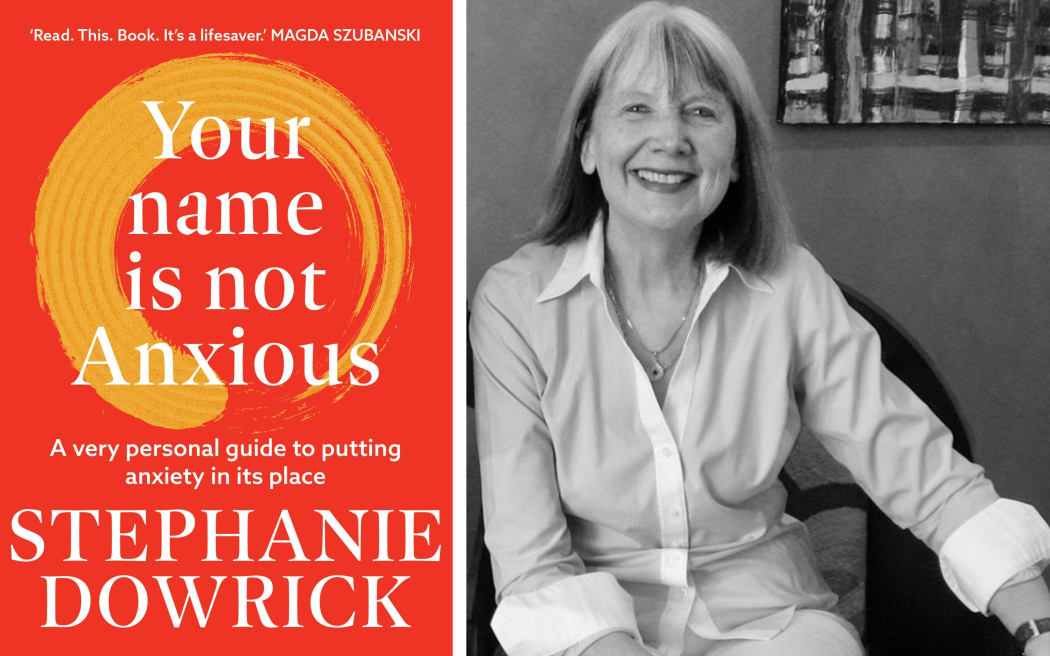From body shaming to overworking and catastrophic thinking, there's a whole gamut of behaviours that come under the umbrella term anxiety, says Dr Stephanie Dowrick.
Dr Dowrick is an award-winning writer, psychotherapy researcher and coach, public speaker, workshop leader, interfaith minister and the founder of The Women's Press in London.
Her latest book Your Name is Not Anxious includes step-by-step guides that explain and manage anxiety.
Chronic anxiety manifests in many different forms, she told Sunday Morning.

Stephanie Dowbrick and her new book, 'Your Name is not Anxious'. Photo: Allen and Unwin
“Social anxiety, body shaming, body anxiety, at the very tough ends something like OCD, obsessional compulsive disorder, but also overworking, over stressing, catastrophic thinking.
“And the feelings that come with them, with any of those manifestations of anxiety can be very flooding.”
The title of her book Your Name is Not Anxious is very deliberate, she says.
“What it means, at least for me, and I think for early readers so far, is that anxiety is part of what's going on. It is not who you are. And it is certainly not all of who you are and the whole body.”
Anxiety is not confined to the mind, she says.
“It is resonating very powerfully in your body, there are things happening in the body, that worsen anxiety.
“And when anxiety sets up home inside your mind, it has extreme sometimes, and very discernible effects on your physical health.
“So, calling it a mental health problem is insufficient to say the least.”
Anxiety is a robber, she says in the book.
“It robs us of so much pleasure and hopeful and optimistic anticipation, rather than dread and fear.
“And I call it a liar, because it tells us that we are much less than we are.”
While writing the book she discovered much about the physiological effects of anxiety, she says.
“This physiological stuff was fairly new to me, and I was absolutely transformed in my thinking about anxiety, by beginning to understand that we have to calm our parasympathetic nervous system, and that we have to reduce this flooding from cortisol.
“Because cortisol is what makes us agitated, makes us aggressive, makes it very hard, for example, to lose weight.
“It certainly makes us sleepless and the more exhausted we are, the less we can cope with these situations that themselves cause anxiety.”
The world itself is an anxious place, she says.
“It's not just the huge existential anxiety of global warming and the climate crisis, and which means that we're going to have evermore climate events. And that affects everybody, none of us will escape that none of us will escape that.
“We've also come through a period of time in which the, the gaps between rich and poor have become so marked.”
Dr Dowrick, who now lives in Sydney, grew up in New Zealand and says the rise in inequality here is stark.
“When I was growing up as a child in New Zealand I would say nobody was homeless.”
Access to housing was almost guaranteed by government intervention, she says.
“People used to get their mortgages from a government body called the State Advances Corporation.
“And if you didn't earn much, you paid 3 percent interest. And if you earned quite a lot, you paid 5 percent interest. And that was that, it wasn't a bank, making vast profits out of your need to have shelter, and a home.”
Her book was also prompted by the episode a close relative experienced.
“The treatment that she received was so inadequate. And oddly, on the psychological side, it seemed to very much to leave out the body.
“People were taught, even in private psychiatric hospital, a kind of mindfulness and a kind of breathing, and so on, and so on, without any context of why this might work.”
Slowing your breathing, if you're very agitated, is not enough, she says.
“[There’s] an assumption that this very limited range of things that you could try would be adequate, without understanding the context, that what is happening to you is a whole-body experience.”
She has structured the book with short, self-contained chapters.
“They can't, when they're already flooded with anxiety, be also flooded with a mass of information.
“I had to present it, or write it, or give it in a way that would make sense in just a few minutes of reading.
“And so, I've made all the chapters very short. I've given them very storytelling headings, and I've told lots of stories, including my own story of anxiety, so that people will feel, this writer is not coming from outside with her white coat on and his stethoscope saying, this is what you ought to be doing.
“No, this writer is coming to her readers saying, I have understood this. And now I understand it so much better and I'm sharing that.”

